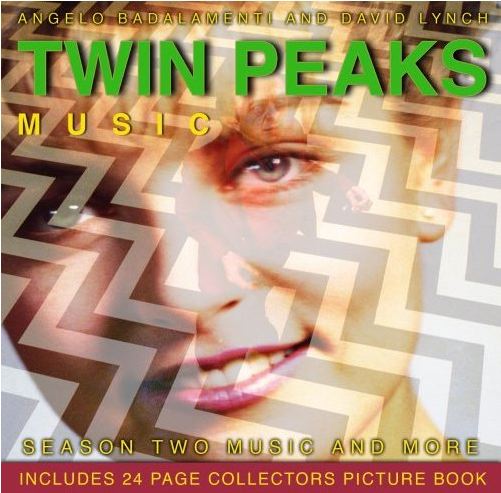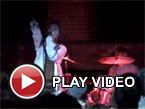Angelo Badalamenti, "Twin Peaks Season Two Music and More"
 Angelo Badalamenti is one of film and television's greatest composers, and his association with David Lynch over the past two decades has yielded some of the most haunting, beautiful, dark and unsettling soundtrack music ever produced. Of all these collaborations, arguably the finest is Badalamenti's music for the cult TV show Twin Peaks, and this disc finally collects all of the great music inexplicably left off of the heretofore released soundtracks for the series and its film prequel Fire Walk With Me.
Angelo Badalamenti is one of film and television's greatest composers, and his association with David Lynch over the past two decades has yielded some of the most haunting, beautiful, dark and unsettling soundtrack music ever produced. Of all these collaborations, arguably the finest is Badalamenti's music for the cult TV show Twin Peaks, and this disc finally collects all of the great music inexplicably left off of the heretofore released soundtracks for the series and its film prequel Fire Walk With Me.This release is long overdue. In the days following the show's initial run, people were so anticipating a disc like this that they finally gave up on the possibility of it coming out, bought Danelectros and formed bands like Labradford and Tortoise. Even Stars of the Lid recorded "Soundtrack For Twin Peaks Episode 30," in an effort to recreate the dark string drones and achingly slow-motion bebop that finally appears on this disc as "Dark Mood Woods/The Red Room." In fact, the conscious invocation of Badalmenti's singular combination of ambient mood music, hallucinatory 1950s nostalgia, emotive synths and languid jazz has been a staple in the "post-rock" scene for the past 15 years. The aforementioned groups managed to have their own identity, but groups such as Bohren Und Der Club of Gore took their painstakingly precise emulation of Badalamenti's Twin Peaks to ridiculous extremes on albums such as Sunset Mission. The leitmotifs and musical centerpieces Badalamenti composed for Lynch's uniquely strange cinematic worlds are so immediately recognizable, so utterly unique, that—in the annals of soundtrack music—they can only be compared to Ennio Morricone's compositions for Sergio Leone's spaghetti westerns, or Goblin's music for Dario Argento's horror films. What is it with Italians and great film music?
This disc, which finally collects many of the soundtrack pieces missing from both the Soundtrack from Twin Peaks disc and the Fire Walk With Me soundtrack, has been released in tandem with the complete Twin Peaks TV series on DVD, which is out at long last. As one who has watched the entire series repeatedly over the years (often on poor-quality Worldvision VHS or bootlegs taped off Bravo), listening to this disc immediately put me back in the strange world of Twin Peaks. It's a place where the sexiest, breathiest downtown cocaine bebop jazz rubs shoulders with spare, fragile piano motifs; where kitschy, nostalgic '50s rock n' roll bleeds into moody, ambient layers of atonal, synthesized strings; where rave music is reimagined as dark, slow-motion country music pulled through the looking glass. This disc announces itself immediately as being far superior to the first Twin Peaks soundtrack; not only because of the range of material available here, but because it is thoughtfully sequenced and each piece is given its own discrete track. The first TP soundtrack made the mistake of being too samey, reusing the same themes multiple times throughout the disc, combining many of Badalamenti's best pieces into long "megamixes" that blunted the music's effect. Also, that first disc contained three Julee Cruise cuts that were already widely available on the Falling Into the Night CD. No such problems here, as this material is 100% previously unreleased in this form.
Much of the tracklist for this CD was produced in open conversation with fans of the show, Lynch and Badalamenti asking people to name their favorite musical bits and themes that had not yet appeared on the previous soundtracks. Because of this process there is nary a wasted track here. "Hook Rug Dance" was a fan favorite: the soundtrack to a rare moment of honest sentimentality for the show, in which Ben and Jerry Horne fondly recall an event from their youth: their babysitter Louise Dombrowski dancing with a flashlight on a hook rug. The song uses vintage '50s echo effects and guitar to deliver a song so sweetly nostalgic that it is positively hallucinogenic. Shelly's character theme (called, appropriately, "Shelly") combines the brushed snares and hi hats of Badalamenti-style bebop with sweeping string arrangements. "Audrey's Prayer" is all soaring strings, closer in its style to the oft-sampled "Laura Palmer's Theme." Alicia Witt's jaunty piano playing for the Hayward/Palmer dinner party in the season two opener is here as "Hayward Boogie." The barbershop quartet that incogruously apppears in episode nine as Cooper receives word that Windom Earle has escaped the insane asylum is also here, perhaps in the interest of completeness.
The inclusions I appreciated the most were the abstract country-and-western pieces such as "Night Bells," formless mood pieces that combine strumming on resonater-style guitars with strange tone-bending effects. If you ever wanted to know why indie post-rock has been obsessed with these kinds of sounds for the past 15 years, look no further. I was pleasantly surprised to find "Blue Frank" here, the companion piece to "The Pink Room" (which appeared on the Fire Walk With Me soundtrack). This is yet another headlong dive into the druggy, trance-inducing country-blues heard during the scene in FWWM in which Laura and Donna cross the border into Canada to attend one of the most fucked-up, bizarre hillbilly raves ever imagined on film. I was a bit taken aback by the inclusion of "Just You," complete with vocals by the ever-annoying James Marshall, but it's actually quite a nice little slice of '50s nostalgia once you forget about the whole annoying character arc of James in the show itself.
The disc ends on a brilliant note, with the nine-minute "Dark Mood Woods/The Red Room." This is the stuff out of which legends are made. The piece is so dark and immersive, so haunting and evocative, that if you have seen episode 29 of the show you simply cannot help but imagine the Pacific Northwestern forest on a cold moonless night, the wind blowing through dry branches, red curtains appearing in a circle of sycamore trees; strange liminal zones where the ordinary becomes surreal, and the surreal becomes ordinary. Badalamenti combines deeply atmospheric synthesized Roland strings with various samples, time-stretched and reverberated into a dark oblivion. Then slowly, the brushed snares, resonating guitar and irregularly fingered bass come in, complete with odd echoplexed and backwards-tracked effects and little sonic details that rise out of the murk at random. Played back-to-back with Jimmy Scott's vocal take on "Sycamore Trees" (from the FWWM soundtrack), the strange brilliance of the Badalamenti/Lynch soundworld comes into focus. Season Two Music and More has been a long time coming, and luckily for everyone, it's better than anyone could have expected.
samples:



